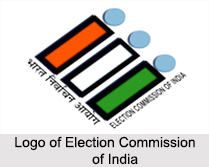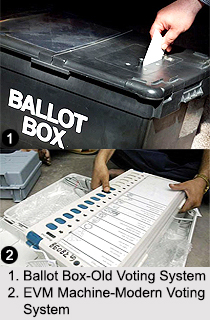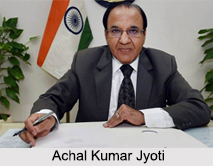 Election Commission of India is a permanent constitutional body, which is responsible for the maintenance of the electoral procedure in the country. It was established in accordance with the Constitution on 25th of January, 1950. The Constitution of India has vested in the Election Commission of India the superintendence, direction and control of the entire election process to make appointments to the Indian Parliament and legislature of every state and to the offices of President and Vice-President of India.
Election Commission of India is a permanent constitutional body, which is responsible for the maintenance of the electoral procedure in the country. It was established in accordance with the Constitution on 25th of January, 1950. The Constitution of India has vested in the Election Commission of India the superintendence, direction and control of the entire election process to make appointments to the Indian Parliament and legislature of every state and to the offices of President and Vice-President of India.
Organization of Election Commission of India
Organization of Election Commission of India relates to the structure or composition of the constitutional body. Originally, the commission had only a Chief Election Commissioner. Currently, it consists of a Chief Election Commissioner and two Election Commissioners. Two additional commissioners were appointed on 16th of October, 1989, but they had a very short tenure till 1st of January, 1990. Later, on 1st of October, 1993, two additional Election Commissioners were again appointed. The concept of multi-member Commission has been in operation since then, with decision making determined by majority vote.
Later, on 1st of October, 1993, two additional Election Commissioners were again appointed. The concept of multi-member Commission has been in operation since then, with decision making determined by majority vote.
Functions of Election Commission of India
Plenary powers vested in the Commission under Article 324 are supplemented further by Acts of Parliament namely, Representation of the People Act, 1950 and 1951, Presidential and Vice-Presidential Elections Act 1952, Government of Union Territories Act 1965 and Delhi Administration Act 1966 and the rules and orders made under them. The Commission is responsible for planning and executing a whole range of complex operations that are required for conducting elections. It also conducts bye-elections and receives election petitions challenging the validity of elections and appoints tribunals to enquire into them. It examines the returns of election expenses filed by the candidates.
Political Parties and Election Commission of India
Indian political parties are registered with the Election Commission of India under the law. The Commission ensures inner party democracy in their functioning. According to the criteria prescribed by the Election Commission, registered political parties are granted recognition at the state and national levels on the basis of their poll performance at general elections. As a part of its quasi-judicial jurisdiction, the Commission settles disputes between the splinter groups of recognized parties. Election Commission ensures a level playing field for the political parties in election fray, through strict observance of a Model Code of Conduct, which evolved with the consensus of political parties. The Commission holds periodical consultations with the political parties on matters connected with the conduct of elections, compliance of Model Code of Conduct and new measures proposed to be introduced by the Commission on election related matters.
Independence of Election Commission of India
Independence of Election Commission and its insulation from executive interference is ensured by a specific provision under Article 324(5) of the Constitution. The Chief Election Commissioner shall not be removed from his office, except in like manner and on like grounds as a judge of the Supreme Court. Conditions of his service shall not be varied to his disadvantage after his appointment. The other Election Commissioners cannot be removed from office, except on recommendation of the Chief Election Commissioner.
Election Commissioners of India
The Indian President appoints Chief Election Commissioner and Election Commissioners. They have tenure of 6 years or up to the age of 65 years, whichever is earlier. They enjoy the same status and receive salary and perks as available to the judges of the Supreme Court of India. The Chief Election Commissioner can be removed from office only through impeachment by the Indian Parliament. The list of Chief Election Commissioners of India is given below.
| S.No. | Name | From | To |
| 1 | Sukumar Sen | ||
| 2 | Kalyan Sundaram | 1958 | 1967 |
| 3 | S. P. Sen Verma | 1967 | 1972 |
| 4 | Dr. Nagendra Singh | 1972 | 1973 |
| 5 | T. Swaminathan | 1973 | 1977 |
| 13 | T. S. Krishnamurthy | 2004 | 2005 |
| 14 | B. B. Tandon | 2005 | 2006 |
| 15 | N. Gopalaswami | 2006 | 2009 |
| 16 | Navin Chawla | 2009 | 2010 |
| 17 | S. Y. Quraishi | 2010 | 2012 |
| 18 | V. S. Sampath | 2012 | 2015 |
| 19 | Harishankar Brahma | 2015 | 2015 |
| 20 | Nasim Zaidi | 2015 | 2017 |
| 21 | Achal Kumar Jyoti | 2017 |




















